[mks_boxquote align=”right” width=”400″ arrow=”0″]These were the days before the technology revolution: we had no laptops, not even a regular phone. We didn’t even have a watch between us. We were two foreign females, alone in the middle of nowhere, as the sun was going down. In India.[/mks_boxquote]The Lonely Planet guidebook declared that Anjuna beach was once the place to ‘see and be seen’, but that in recent times the adrenaline-seeking party crowd had deserted Goa in favour of more glamorous Thai beaches. We didn’t really expect it to be busy—but something seemed amiss.
Stepping up into the bus earlier that day, backpacks weighing heavy and sweat dripping down our backs, we told the driver that we were heading for Anjuna and paid the fare. Lazily he waved us on and the bus began its meandering, bumpy journey through gorgeous tropical forest. We had spent a few days at Colva, and were looking to explore some of Goa’s other beaches.
We had no idea how long it would take us to reach Anjuna, but with plenty of time on our side we were in no rush. As the hours passed other passengers left the bus, until we were the only ones left. Eventually, the bus; an ancient, rusting construction of metal that had once been a musty shade of green, turned a corner to reveal a dramatically sweeping, rocky coastline. We were driving along the top of a cliff edge and the empty beach below revealed tiny sandy inlets permeated by jagged rocks. In all honesty, it looked more suitable for a suicide than sunbathing.
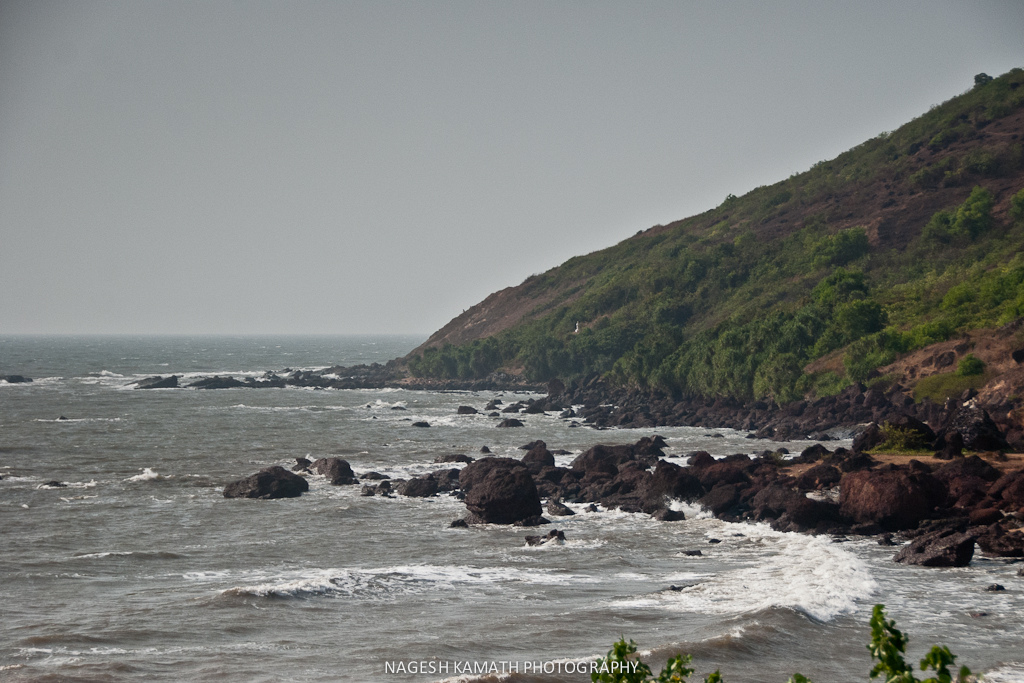
The bus ground to a halt, the driver peering at us expectantly. ‘Here. Anjuna’ he said.
‘Here?’ I asked, looking at him in confusion. ‘But there’s nothing here.’
He wagged his head, the way that only Indians do.
‘Anjuna’ he repeated.
Leaving us no choice, we got up and dragged our backpacks off the bus.
The bus coughed back into life, dumping a cloud of toxic fumes and dust on us as it pulled away. We turned to watch it make its slow retreat along the road.
Silence.
There was no bus stop, and, surprisingly for India, no signs of any habitation. Hell, I would have even been thankful for the usual swarm of touts with their aggressive tactics.
Silence.
We sat down on our backpacks, wiping sweat from our brows. The bus had not been air-conditioned, but the open windows had created a cool breeze. We were sitting on top of a cliff edge with the late afternoon sun, still hot, beating down on us. We pulled out the Lonely Planet and scoured the maps, looking for any clue to our whereabouts.
The map for Anjuna clearly showed a bus stop, and next to the bus stop was a row of guesthouses and restaurants. Looking up and down the deserted road, it was clear that something was wrong. These were the days before the technology revolution: we had no laptops, not even a regular phone. We didn’t even have a watch between us. We were two foreign females, alone in the middle of nowhere, as the sun was going down. In India.
This was not a good situation.
It started as a dim sound in the distance, rumbling slowly closer and closer until a lone motorbike appeared in view on the horizon. We watched it approach, in a scene that wouldn’t have been out of place in a Hitchcock thriller. Drawing parallel to us the bike stopped, and the rider—an Indian man in his 40s—alighted. His entrance was remarkably, coincidentally, well-timed.
‘You need hotel?’ he asked.
It couldn’t have been more obvious that we needed a hotel, and I couldn’t shake the unsettling image of Norman Bates from my mind.
‘Yes’ we replied, neither of us wanting this to be our only option. Unfortunately, it was our only option.
‘Then you are in luck! I have a hotel.’ His face beamed with a creased smile. ‘Do you want to see? It is close, very close’.
How convenient.
Given that there was absolutely nothing else around, it seemed strange that a hotel would be close, but with the sun now sinking dangerously close to the horizon we had no other choice.
‘One of you must ride with me. The other wait. I will come back’’, he said. I looked over at Vicky, and could see the apprehension that I was feeling openly mirrored on her face.
With confidence that I didn’t feel, I smiled and accepted his offer. As I left I said loudly to Vicky that I would call her as soon as I reached his hotel. I hoped that my shaking voice wouldn’t betray the lie.
In what is probably the most stupid thing I have ever done while travelling, I got onto the bike, and allowed a complete stranger to take me away from my friend and into the Indian forest alone. I spent the next 10 minutes with my heart hammering in my chest—he must have felt it as I held onto him to keep myself on the bike—as we bumped precariously down a steep mountain track, and I hoped beyond hope that I hadn’t made a fatal mistake.
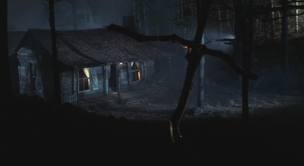
He stopped outside a small wooden hut—one of only two—it really did look like the perfect scene for a murder, and he ushered me inside. To my surprise it was a small room, complete with a bathroom. I agreed to take it and told him to go back and collect Vicky, who must have been going out of her mind with worry.
Clearly, we didn’t get murdered, but I don’t think we made it to Anjuna either. We stayed in this isolated place for 3 days, and walked down to the beach once. It was a secluded rocky bay, completely deserted. The only ‘restaurant’ was the hut next door to ours, and there was no menu—just one dish that could be prepared for us, and a forlorn tube of sour cream Pringles.
Maybe the Lonely Planet was right, people really had deserted Anjuna completely. Or, as it was only 7 months after the Indian Ocean Tsunami, we questioned whether Anjuna had been affected by the disaster. We didn’t see a single other person while we were there.
In hopes of finding other travellers, we rented a motorbike from the man who owned the ‘hotel’, but were stopped and fined heavily by the police only 30 minutes later. They ordered us to return the bike immediately. We’d had enough, the next day we went back to the road determined to wait until a bus came along to take us away—we didn’t care where to.
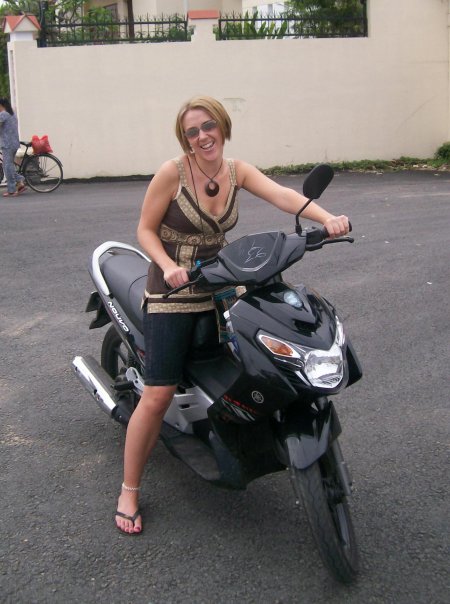
I still can’t really fathom what actually happened. The bus driver did not take us all the way to Anjuna, of that I am sure. I expect that the ‘hotel’ owner was simply a family member or friend who wanted to make some extra money, the bus driver most likely called him once we left the bus. If there had been other passengers, I don’t think he would have told us to get off in the middle of nowhere.
Whatever happened, it was certainly a strange and memorable part of my India trip. When I return to India later this year, I plan to visit Anjuna to finally see what it looks like!
Have you ever had a strange experience while travelling? Or have you ever failed to reach a destination for some reason?

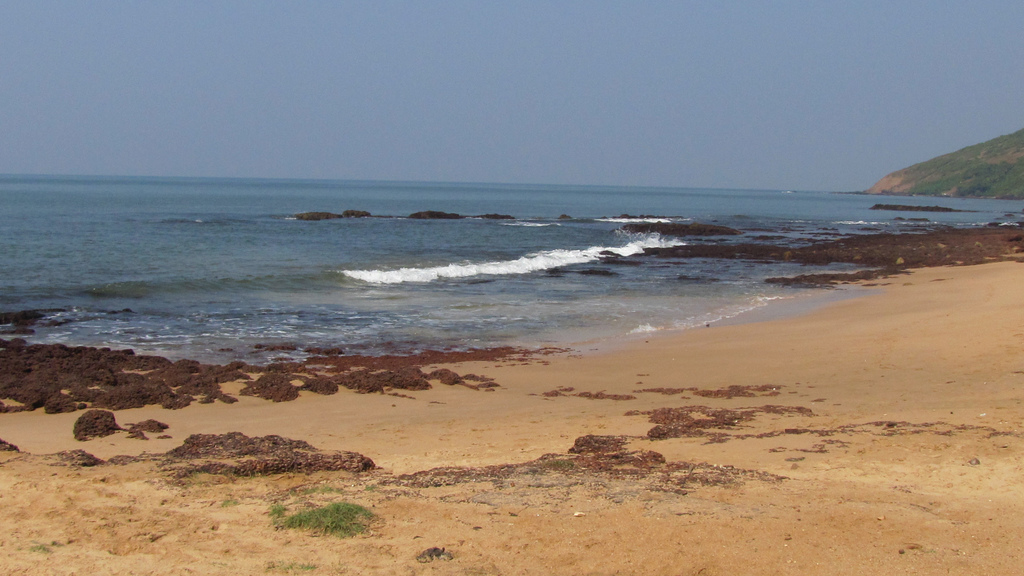
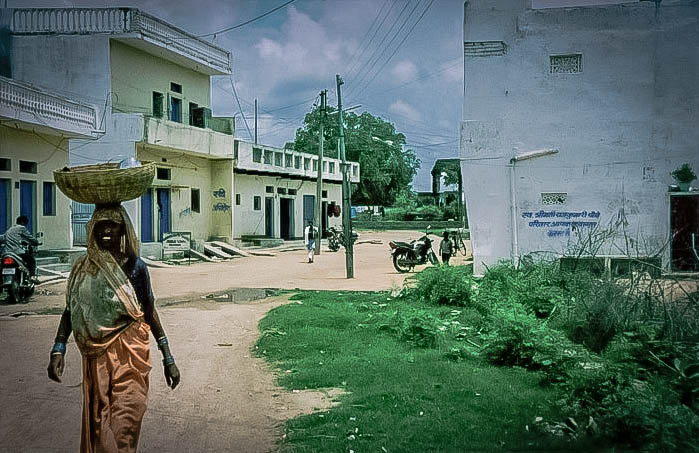


Wow what a strange story,so you don’t know where you were for 3 days? It is for sure much easier with smartphones now 🙂 I went to Anjuna last december and it’s a nice place if you like to party, plenty of backpackers. The beaches aren’t the best, but it has a very relaxed atmosphere. My favorite was Palolem in the south of Goa and surrounding beaches.
I loved Palolem too, that’s where we went after our disappointing Anjuna experience. I would love to know where we actually were!